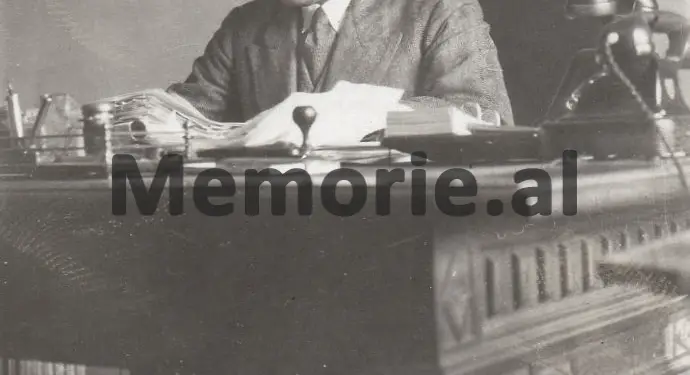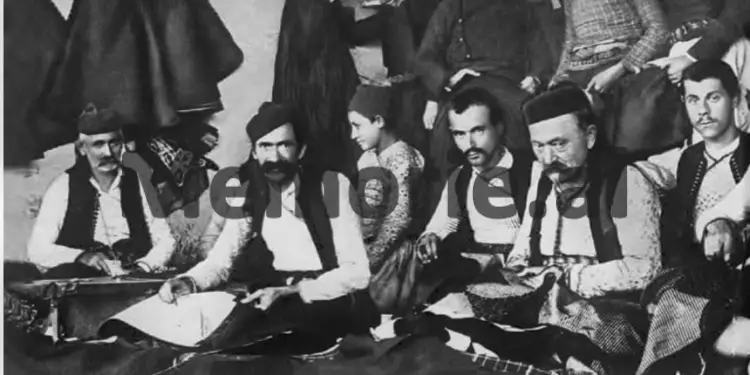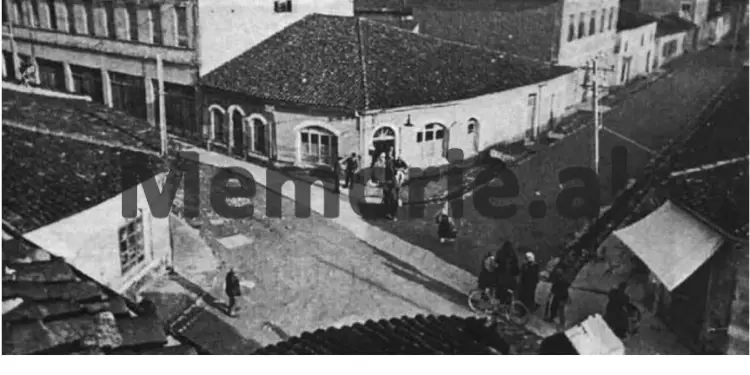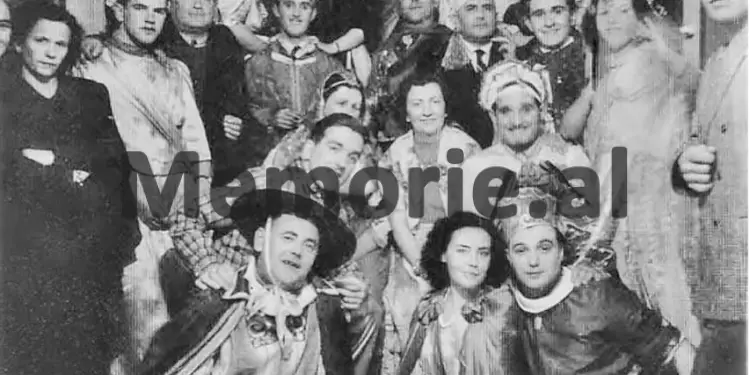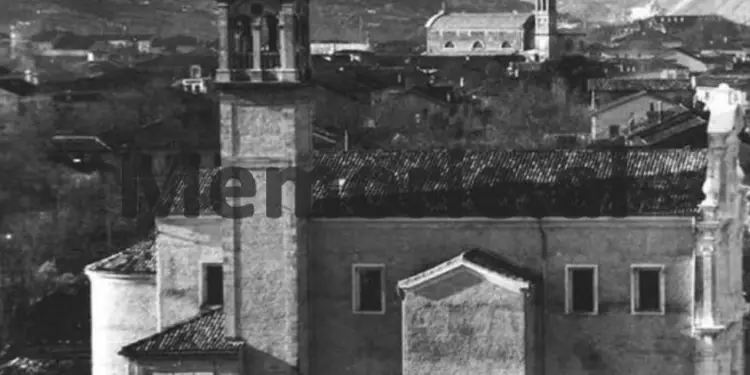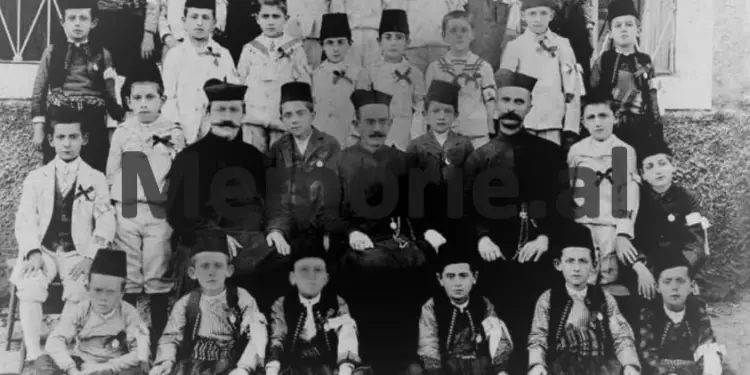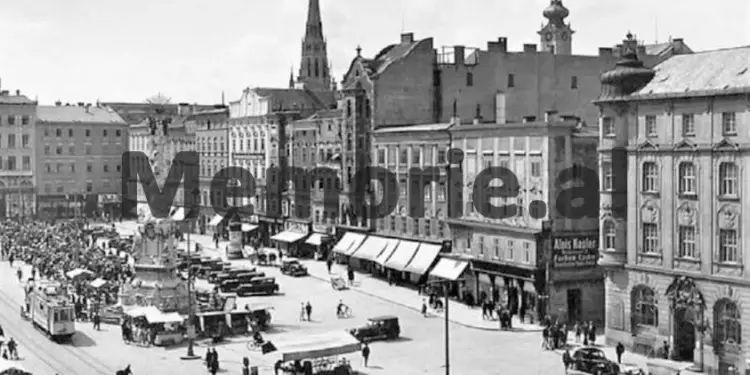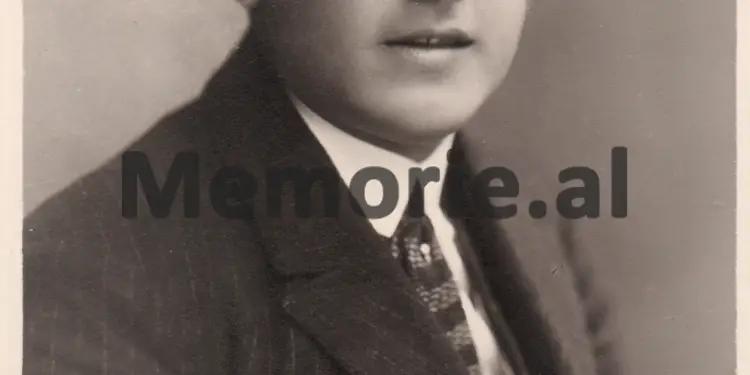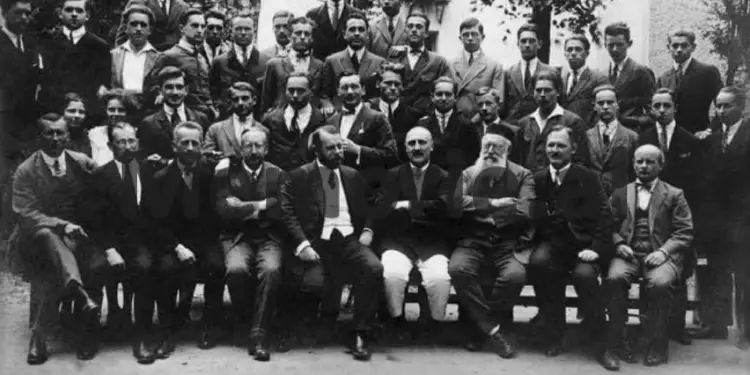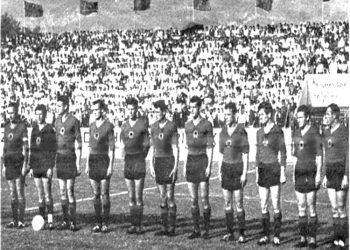By Arben Pustina
– Rrok Gera, a proper statesman –
FORWARD
Memorie.al / This book aims to convey to the public the image of a perfect man, who lived in other times, but who was the best example, not only of what an ordinary man can represent, but, next first, as an example of a noble, distinguished, omniscient and, above all, honest statesman. Having in his genes the noble virtues of his origin, being formed as a personality in a wonderful environment, such as Shkodra at the beginning of the 20th century, and graduating from one of the most prestigious universities in Europe, such as that of In Vienna, Rrok Gera had all the potential to be one of the important figures who gave rise to a rapid development through comprehensive reforms in Albania in the 30s of the last century.
This development reached its peak with the government of Mehdi Frashër, considered perhaps the best Albanian government of all time, formed for the most part by non-political persons, among who was Rrok Gera. For 10 years, or more, as a minister or in other high state functions, he worked with conviction that he was walking on the right path for the consolidation of the Albanian state, a process for which he said he had no time to lose. Economist, financier, diplomat, lawyer, Gera was a specialist who advanced towards the top with his professionalism in an environment where the old factions, which were almost dominant in politics and governance, lost ground in front of young and educated people good.
During his career, he faced all the responsibilities arising from the duties he undertook. And this not only in the drafting of numerous laws and all-round reforms in finance or economy, in efforts against corruption, in opposition to bureaucrats and conservatives who tried to limit every new initiative, but also in Rrok Gera the constant resistance to expansionist goals of Italy, which had long drawn up its plans to devour the Albanian economy. In the following pages, you will be able to see that in the face of these goals, the Albanian authorities tried to resist, and one of those who resisted until the end was Rrok Gera, who, throughout the years of his activity, took initiatives and made efforts strongly opposed to Italian interests.
Rrok Gera is probably the only one among the high personalities before 1944, who was acquitted of all the political charges against him. And this has its own reason, which the reader will understand here, page after page. In the meantime, I would like to add that a monograph was written about Rrok Gera by the respected academic Vladimir Misja, but the book that is offered to the reader now deals with the issues more broadly, the documentation is more numerous and the publicism is much more voluminous. In closing this preface, I must emphasize that, in all the material written on the following pages, there is nothing superfluous or inflated, except the documented truth.
ORIGIN, FAMILY AND CHILDHOOD
Gerejt appear in Shkodër from the end of the XVIII century. According to family records, their origin is somewhere in the Northern Highlands, in areas with exceptional values and virtues carried over the centuries. “…I bless the moment when the idea came to me to push towards the Highlands. If I had excluded this tiring and fascinating stage from my itinerary, I would not have understood what Albania is, because Albania is interpreted more by a mountain tower than by all the boulevards of the capital…”, the journalist wrote. the great Italian, Indro Montanelli, in his book “Albania one and one thousand”, a book with impressions of travels to Albania in 1939.
Fascinated not so much by the natural beauties as by the people of the Northern Highlands, Montanelli felt badly for them: …“A lonely and harsh life develops the individual personality of these people to an extreme. Every man has a world and in this world he is an absolute despot. Approaching this world, you, the European reduced by society, immediately feel the gigantism of this primitive human nature and submit to it without the possibility to measure and judge it…”, wrote the Italian journalist, stunned by what seen in the Highlands. Despite the fact that the impressions of his trip through the Highlands, the famous journalist wrote at the end of the 30s, we can say that it is about the same environment of traditions, customs, education, values and virtues of a province from which Gerejt moved about two centuries ago towards a capital, as Shkodra was at that time.
To know someone well, to understand the breadth of his figure, be it a simple person or a personality, you must also know his deepest roots, so here we emphasized something that, obviously, has its role in the formation of personality and character of Rrok Gera. He was born on August 15, 1901, in the city of Shkodra and was the youngest son of Zef Nikollë Gera (Shkodër 1844-1919) and Lucije (Montanelli, Indro: “Alshqipëria një i njemijë”, “Letters”, Tirana 2004, p. 34. 2 Ibid., p. 41. Cuk Kolë Vasës from the family of Pashko Vasës). The children of Zef Nikollë Gera were five girls and four boys, in order: Roza, Shaqja, Tonia, Tefa, Laca, Gaspri, Liza, Adelaidja and the last Rroku.
The Gerej house in the Firej neighborhood, near Kiša e Madhe, on the street that still bears the name “Gerej Street”, was a house with all the characteristics of a Shkodra citizen’s apartment. Located on a land area of about 4,000 square meters, the house had a large yard paved with cobblestones, a stone trough for washing clothes, a well, etc. The yard was always very well maintained. There was no shortage of rare decorative plants and trees, while the surrounding walls of the courtyard and garden were covered with wild roses. Knocking on Gerej’s door to “beg” flowers for a girl who was getting married was something common. In the Gera family, a healthy upbringing prevailed and there was a lot of respect for elders, friends, or religious faith. This family helped the poor families of the neighborhood where they lived, and nowadays, the sons of these families remember with gratitude the generosity of the Gerejs.
Zef Nikollë Gera (Rrok Gerë’s father) was a really fair man and was often called to divide family conflicts, which at that time were resolved by the most respected people from Shkodran opinion. He had a tailor shop for national clothing, located in the center of the Sarreq neighborhood near the Cathedral Church, in which 12 people (tailors) worked. With this shop he supported his family of 11 members. In a photograph of the famous Marubi, later reproduced as a postcard, Zef Nikollë Gera appears at work, together with his assistants.
The postcard and the fact that Zef Nikollë Gera was a famous tailor are also mentioned in a letter from Gjon Kamsi to Zihni Sako, director of the Institute of Folklore in Tirana, where Kamsi complained about the shortcomings of the folk costumes of the representatives of Shkodra at the Folklore Festival of Gjirokastra, compared to the former costumes made by Shkodra craftsmen: “…known for their work of the art of clothing, master tailors; Gjok Baba, Mati Tukja, Kole Raboshta, Mati Ujka, Gjon Shahini, Rrok Gera, etc.”.
At the beginning of the 20th century, when Rrok Gera was born, Shkodra was a city with versatile and prominent development, due to its geographical position, economic level, history, culture and the people who represented it. The beginning of the 20th century was especially full of special events for Shkodra. Thus, the earthquake of 1905 in Shkodër was felt very strongly, while in winter, the river Kir often came out of its bed and flooded the city. On May 1, 1905, somewhere in the outskirts of the city, the first strike was organized in Shkodër, which was also the first for the whole country.
The years 1900-1912 passed with the great echoes of the wars for independence, but Shkodra was seriously endangered in the following years, when the Montenegrins surrounded the city and bombarded it with shrapnel, which hit the walls of the Cathedral Church, where many people had taken shelter, and which was just a hundred meters from the Gerej house. In the memoirs of Father Justin Rrota, given to “Gazeta Shqiptare” by Father Vitor Demaj, ofm, for Wednesday, March 12, 1913, it was described how the Montenegrins mercilessly hit even the religious objects in the city of Shkodra: “…Then today, apparently, he had an affinity with the city’s Cathedral Church. “More than 20 of those big guns fell on the Great Church, where some 1000 people were hiding, almost certain that they would find salvation there, because Montenegro had never targeted the holy places.”
During the years 1913-1914, the military administration of the Great Powers was established in Shkodër and, for this reason, this period is also called the “time of the international”. All these events followed their course, while Rrok Gera grew up in a family where national, religious, or family holidays were celebrated quite nicely. At school, but also in many activities of a religious nature. Letter from Gjon Kamsi to Zihni Sako, Shkodër, October 30, 1978. “How the Montenegrins bombarded Shkodra in 1913”, Gazeta albanian, 23.05.2010. Rrok Gera or, the people of Shkodran were used to love music and its instruments. At that time, Shkodra held the record as a city for the number of pianos that its residents had in their homes. Involved in choirs, or solos, at weddings and on other occasions, the citizens of Shkodra were true musical artists.
This was undoubtedly reflected in the Gerej house, where the boys kept the tradition and sang patriotic songs accompanied by musical instruments. A document of the Great Church talks about some singers of the choir of this church. Among them was Tefa Gera, the eldest son of the Gera family. Even Rrok Gera himself sang very beautifully. In a letter written by him, sometime around 1960, Gera affirmed his family’s special relationship with music: “… the party in our house has traditions since the Terzis, our father’s workmates. According to Tefe Gera, it is proven that they have collectors. The Gera tribe at a carnival party. Rrok Gera, careful of Shkodra songs and dances and a good singer, and Gaspë Gera, modest violinist of the Shkodra heng. Their friends in the heng usually have Ndoc Kumrija with the kernte, Zef Hil Gega with the tambourine and some other dilettante with clarionet.
These are often gathered and have parties for fun in our house, among the houses of friends and relatives in the village and in the village, during parties, feasts or weddings depending on the occasion…”. Just like a number of other Shkodra citizen families, the Gerejs had a really prominent lifestyle. In the exterior of the house, the absolute cleanliness of a magnificent yard stood out, while inside the house there was furniture of the time, where there was also a large radio, through which the family knew what was happening around the world. In a photograph, taken on the occasion of the carnival celebration, you can see almost the entire Gera tribe, with grandchildren, who posed wearing special costumes: Roman, Spanish, Turkish, Mexican, etc. Almost all of them had studied abroad, or had been educated in local schools with foreign teachers, or had simply had work contacts with foreigners, from whom they had received not only knowledge and work experience, but also culture for the way of life. .
The protagonists of this picture were talented in painting, in musical instruments, they sang, they recited up to thousands of verses by heart, they played in the theater, they participated in sports activities (one of the nieces of the house was a national champion in swimming), they were excellent in lessons ( they also won international awards) and in foreign languages, as well as they were very lively and happy, always pillars of their society and of the many holidays that were organized in Shkodër. Above all, Gerej were noble in their behavior among themselves and towards others. Never banal expressions, never heavy words, but a lot of dignity and mutual respect. Also, we emphasize that Gerejt were very hardworking. In addition to being active in the structures of the Albanian state, the Gera brothers were also engaged in trade from an early age. The family had shops, land in Bardhej, Ashte, Beltoje, etc. The Gera brothers also owned a cigarette factory.
However, there has been no shortage of words about this family from any Shkodra Catholic family. These words had no real basis and came from old political stories dating back to the 20s. So, there were people who, contradicting the historical reality, murmured here and there about Gerej, but it is a fact that until today, in any scientific publication, there is not even a hint about these words. Rrok Gera’s older brother, Tefa, held positions in the Municipality of Shkodra, while in 1925 he was elected a deputy in the Albanian Parliament. The other brother, Laca, was the controller of the Treasury in the Ministry of Finance, chief budget officer in the Ministry of Finance, member of the Control Council in 1925-1930, chairman of this Council in 1926 and, later, until April 7 1939, head of the General Directorate of the Defense Command.
For the performance in this task, on 30.08.1938, Lac Gera was awarded by King Zog the decoration: “Commander of the Order of Skenderbeu”. Another brother, Gaspri, was a clerk at the Shkodra Customs. Tefa’s son, Zefi, brilliantly finished his studies at the University of Bologna in 1943, with the degree of “Doctor in Industrial Chemistry”, and has made an extraordinary contribution to the development of non-ferrous metallurgy in Albania. Rrok Gera himself has been twice Minister of Finance and once Minister of National Economy, for almost two years chairman of the Control Council, for several years Secretary General of the Ministry of Finance, as well as in other duties.
EDUCATION
The city of Shkodra reflected the high level of economic and cultural development with a number of educational and cultural institutions, where high-quality education was provided and where great names were formed. View from Shkodra 1925, Rozafat fortress in the background. The development of education in Shkodër and in the northern areas of the country probably started about four hundred years ago. Father Donat Kurti, in a study from 1935, talks about Albanian schools that existed in Pllana, Blinisht and Shkodër, even as early as 1638. He also provides another very important piece of information in his study: the fact that in Obot of Shkodra there was a printing press since around 1500, that is, only a few years after it was invented by Guttenberg.
The American researcher Edvin Zhak, in his work entitled “The Albanians: An Ethnic history from Pre-historic Times to the Present” (Albanians; an ethnic history from antiquity to the present), writes, among other things, about the school opened in Shkodër by the Franciscans in 1855, which was called “Illyricum”, as well as for the initiative of the Jesuits for the opening, in Shkodër, in 1877, of another center of higher education: the College of Saint Francis Saver (St. Francis Xavier College).
This school provided about 400 students with technical and commercial education and in 1888; it founded the Meteorological Observatory, the first of its kind in the Balkans, which operated until 1946. In 1878, the stigmatine nuns opened the Franciscan Girls’ School in Shkodër for 200 girls. It was at the Saverian College that Rrok Gera started primary school in 1906, just like his older brothers: Tefa, Gaspri and Laca. After completing primary education, he started high school, at this college. But in this period, a new perspective opens for Gera: In those years, the Austrian state awarded scholarships to many Albanian boys, and one of those who benefited, starting from the excellent results in lessons, was Rrok Gera, who in 1917, he was awarded a scholarship to continue high school in Vienna.
In 1917, Europe was embroiled in a bloody and large-scale conflict such as the First World War, of which Austria-Hungary was also a part, which, like every state at war, felt the weight of this world conflict. . Every beginning is difficult, but Rrok Gera did not find it difficult to adapt to Austria, as he had created a solid knowledge base at the Saverian College and had learned the German language. From the beginning, the Viennese environment made it its own with museums, operettas, libraries, etc. One of the first things he did was visit the Vienna Museum, where the weapons and helmet of our National Hero, Gjergj Kastriot Skenderbeu, were on display. Although they were very young, Gera and his two friends managed to convince the Museum staff to allow them to take a picture with Skanderbeg’s sword in hand.
In fact, in this photograph, on the sword, Rroku has handwritten the words: “Skënderbeu’s sword”. But living conditions in Austria became very difficult after the end of the First World War. In her work “Paris 1919”, the writer Margaret McMillan gives us a clear and accurate picture of what was happening in Austria, while at the Peace Conference in Paris, discussions continued to determine the fate of the post-war period. The Austrian countryside no longer had food sources, the country was filled with the unemployed and sick, and there was a lack of fuel for heating. Meanwhile, the political situation was even more serious, as Austria was accused of being a country that had fought against the Allies. This situation, as well as the death of his father, forced Rrok Gera to temporarily interrupt his studies at the Commercial Academy of Vienna (High School) and return to Shkodër, where he helped his brothers in a commercial activity.
Then, Rrok Gera returned to Austria, this time not in Vienna, but in Linz (the city then had about 100,000 inhabitants), where he continued the Commercial Academy, where he also received his Matura. His secondary education years were spent in a friendly and benevolent environment. He was regular and serious in his relations with the Austrians, 8 Makmilan, and Margaret: “Paris 1919”, Plejad, Tirana 2006, p. 287. 26 Rrok Gera who were quite strict and did not tolerate the “violations” that young students could commit. Rrok Gera himself stayed up late on his books and did not allow them to “disrupt his peace” while he was studying. With his mouth agape, he told how he had warned a fellow student that he would lock him in the bathroom if he continued to distract him from his studies. After graduating from the Commercial Academy in Linz, Rrok Gera continued his higher studies at the Faculty of International Economic Relations at the University of Vienna, with a scholarship from the Albanian state, signed in 1924 by the Minister of Education, Luigj Gurakuqi.
Several years had passed since the end of the war. Austria began to recover little by little and Gera, now a student, felt good in Vienna. Without at all neglecting his studies (the lights in the apartment where he lived at “9. Eisengasse 23/8”, or later at “XVIII Hofstattgasse 2/5”, were turned off very late), he found the time to make good use of his presence in the capital Austrian. As he himself said, he found time to go to dance classes, to the ski slopes, to the banks of the Danube for swimming, or to the famous Viennese operettas. With his desire and willingness to learn everything, Rrok Gera amazed the dance instructors with his dancing skills, for example. Also, Gera was part of the student society and was not absent especially in the activities that took place on the occasion of national holidays. 9 He was active in various patriotic associations, such as the association “Albania”, and wrote in its organ, in the magazine “Djalëria”. , dealing with economic and financial problems.
“Mercantilism and the balance of trade and payments” and “Paper money” are two of the articles that “Djalëria” magazine published in 1920 in Vienna, and, in terms of the importance of the topic and its scientific, social and artistic values, was considered second only to the magazine “Albania”, which Faik Konica had published in Brussels in 1902. “Djalëria” had set itself the goal of building a democratic and Western-style Albanian state. He published in that magazine in 1927-1928. At that time, Rrok Gera knew compatriots who also studied in the Austrian capital, such as: Frederik Shiroka, Aleks Buda, Sokrat Dodbiba, Kolë Mirdita (Helenau), Daniel Rodiçi, Skënder Luarasi, etc.
But even for Rrok Gera, the day came to finish his higher studies. On July 12, 1928, he defended his degree with excellent results. Present in the exam room, Filip Llupi, a student at that time, has affirmed that after the answers given by Gera, the members of the exam committee and the entire audience applauded him for several minutes. A few months later, Rrok Gera completed his studies in Vienna, receiving the degree of “Doctor in Economic Sciences”. At these times, one might wonder what direction he would take his life while he was abroad with an excellent education just completed, but Gera did not even consider returning home. /Memorie.al
The next issue follows





